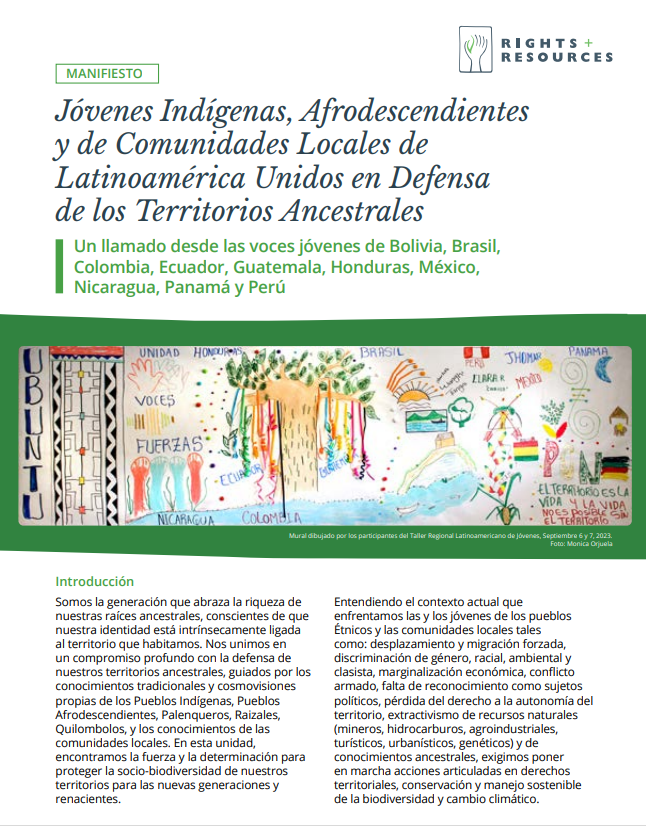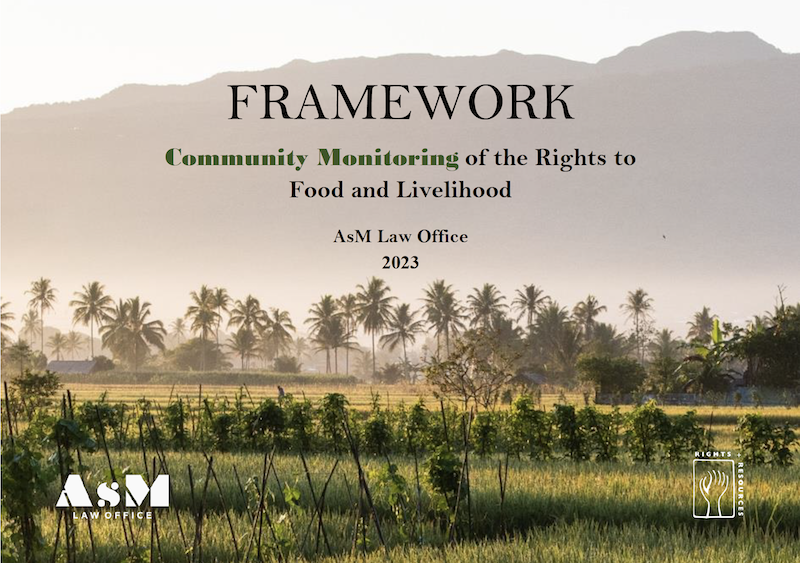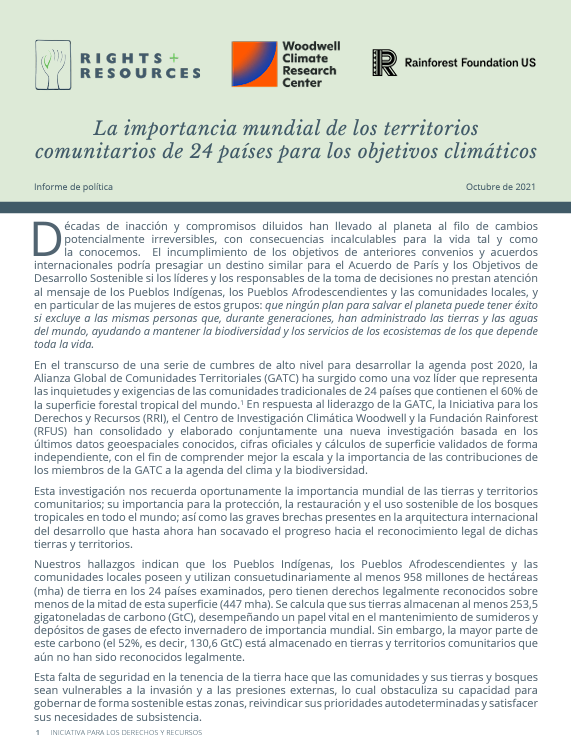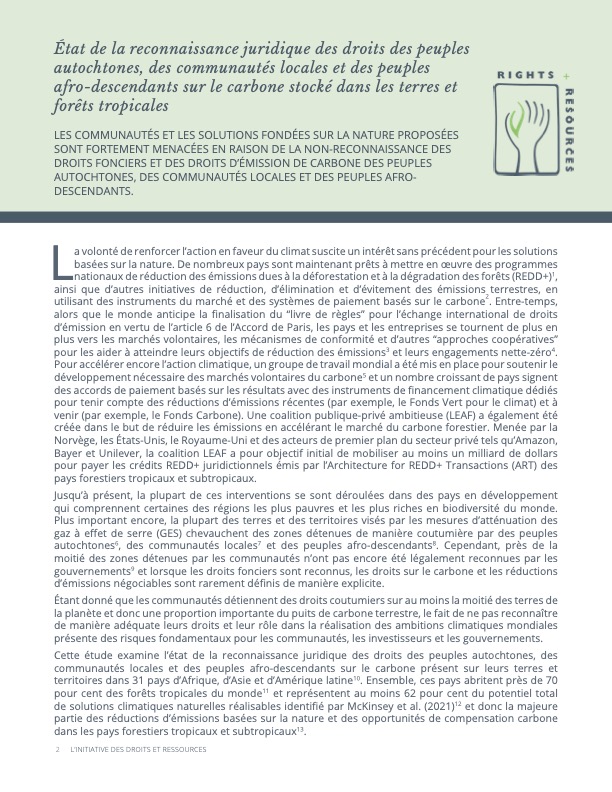Focal point
Location
The Rights and Resources Initiative is a strategic coalition of international, regional and community organizations engaged in development, research and conservation. Together, we are working to encourage greater global commitment and action on pro-poor tenure, policy and market reforms.
The RRI coalition is formed by a group of core Partners who conduct work in specific areas of their regional and thematic expertise. Partners also engage with a wide group of collaborators who participate in and support RRI activities around the world. RRI is a strategic coalition that goes beyond the traditional set of international development actors to involve a wide spectrum of organizations, each of which provides a critical perspective in the larger chain of actors necessary to advance change.
Our Mission
RRI’s Mission is to support local communities’ and indigenous peoples’ struggles against poverty and marginalization by promoting greater global commitment and action towards policy, market and legal reforms that secure their rights to own, control and benefit from natural resources, especially land and forests.
Global Challenge, a Global Opportunity
Forests cover close to 30 percent of the world's land area, and more than a billion people rely on forests to a significant extent for their food, fuel and income.
An estimated 350 million indigenous and tribal peoples are at least partly dependent on forests, including some 60 million who are substantially dependent on forests for their subsistence and livelihoods. Forests are also particularly important to poor women, who shoulder much of the burden for hauling wood and collecting and marketing forest products.
Dominant models of forest industry and conservation have often exacerbated poverty and social conflicts and have precluded pro-poor economic growth. The lack of clear rights to own and use forest land, develop enterprises, and trade in forest products has driven millions of forest dwellers to poverty and encouraged widespread illegal logging and forest loss.
The world will not meet national and global goals to reduce poverty and protect the environment unless poor peoples' rights to land and resources are strengthened. Neither will the world effectively mitigate or adapt to climate change without clarifying local tenure and governance. The next two decades are critical--both for the poor and for the forests.
There are reasons for optimism. Organizations of indigenous peoples and forest-dwelling communities are gaining voice and opportunity, and after decades of limited action many countries are beginning to consider far-reaching legal and policy reforms. There is a major opportunity to advance the rights and livelihoods of forest peoples by establishing the institutional foundations for sustained conservation and forest-based economic development.
Resources
Displaying 6 - 10 of 109Jóvenes Indígenas, Afrodescendientes y de Comunidades Locales de Latinoamerica Unidos por la Defensa de los Territorios Ancestrales
Los días 6 y 7 de septiembre de 2023, un grupo de 18 jóvenes líderes Indígenas, Afrodescendientes y de comunidades locales de organizaciones de la Coalición de RRI se reunieron por primera vez en Bogotá, Colombia
Los jóvenes líderes, procedentes de 10 países de América Latina, comparten un objetivo en común: defender las tierras ancestrales y los derechos territoriales de sus pueblos y comunidades, para la gestión sostenible de estos territorios y la protección de sus ecosistemas.
Principles of Community Monitoring
This document shares emerging ideas, principles, and good practices to socialize the concept of Community Monitoring among companies and investors in land-based sectors, as well as outline steps they can take to meaningfully engage with Indigenous Peoples, local communities, and Afro-descendant Peoples to monitor and respond to the potential environmental and human rights impacts of their operations, supply chains, or investments.
Community Monitoring of the Rights to Food and Livelihood
This framework serves as a guideline for evaluating the fulfillment of the rights to food and livelihood within the business and human rights framework. The guidelines in this framework can be adopted individually by each party and jointly or collaboratively between parties.
La importancia mundial de los territorios comunitarios de 24 países para los objetivos climáticos
Esta investigación nos recuerda oportunamente la importancia mundial de las tierras y territorios comunitarios; su importancia para la protección, la restauración y el uso sostenible de los bosques tropicales en todo el mundo; así como las graves brechas presentes en la arquitectura internacional del desarrollo que hasta ahora han socavado el progreso hacia el reconocimiento legal de dichas tierras y territorios.
Rapport : État de la reconnaissance juridique des droits des peuples autochtones, des communautés locales et des peuples afro-descendants sur le carbone stocké dans les terres et forêts tropicales
Cette étude examine l’état de la reconnaissance juridique des droits des peuples autochtones, des communautés locales et des peuples afro-descendants sur le carbone présent sur leurs terres et territoires dans 31 pays d’Afrique, d’Asie et d’Amérique latine.








